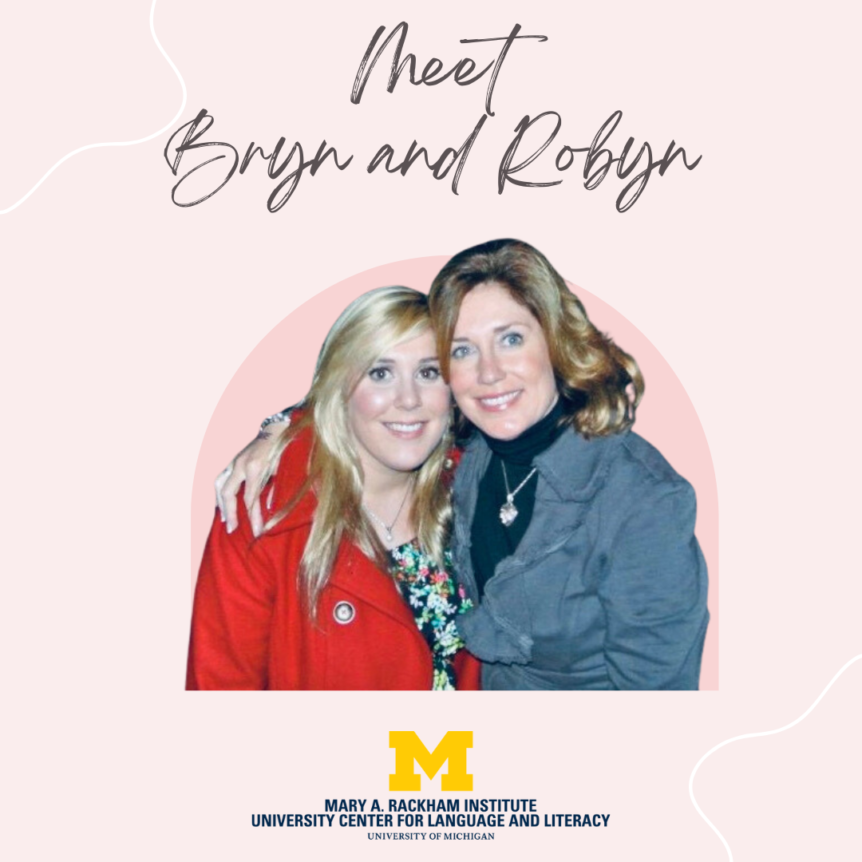Parents hope to share a bond with their children, especially as they get older. After years of raising and nurturing a child, many parents look forward to getting to see their children grow into adults and appreciate who they are in new and different ways.
While raising a child is never completely done, regardless of age, most parents never imagine having to help their children learn the basics more than once: learning to walk; learning to talk. But that’s exactly where Robyn Bowles found herself.
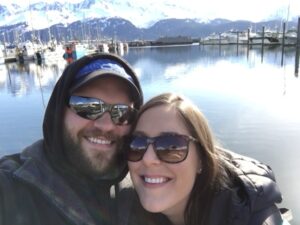
Bryn and Derek, a few months before Bryn’s brain injury. (Photo courtesy of Robyn Bowles.)
In 2019, the Bowles family was savoring life. Mom, Robyn, was a forensic nurse and married to JB, a pilot for American Airlines. Their son, Connor, was a pilot and flight coordinator, and their daughter, Bryn, was a registered ICU nurse. Robyn and JB were enjoying their new titles as “empty nesters” in Texas and were preparing to build a retirement home in Washington state. Both children lived in other states — Connor in Missouri and Bryn in Alaska— and the family was preparing for a reunion trip to Alaska in June 2019.
In May 2019, Robyn and JB received the phone call that would change their lives. Bryn had collapsed while out on a run and was now in the Emergency Room (ER) at Providence Alaska Medical Center — the same hospital where she was a nurse.
Bryn was rushed to the ER, and a CT scan revealed that an artery in her brain had ruptured due to an undiagnosed brain aneurysm, which left her with a Hunt Hess Grade IV hemorrhage. Robyn recalled: “Her neurosurgeon, Dr. Ben Rosenbaum, described the massive bleeding in her brain as ‘sinister.’ Her brain was already so swollen it had shifted, and she had only a few minutes to live without surgery.”
Bryn was taken to the operating room and a large portion of her skull was removed so her brain could swell.
The surgeons who Bryn previously worked with were now operating on her. Dr. Rosenbaum called Robyn and JB to share Bryn’s condition with them, and ask them two important questions: How fast could they get to Alaska, and were they united as a team?
That phone call, Robyn said, was the moment that divided her life into before Bryn’s traumatic brain injury (TBI) and after. It took her a year to digest how serious that call was, and how the doctor was trying to prepare them.
“I thought the doctor was asking how fast I could get to Alaska, simply to comfort Bryn so that she could be with her mother,” Robyn said. “I didn’t realize he was asking how fast I could get there, because she was so close to dying.”
An ‘Abyss of the Unknown’
Robyn went to Alaska as quickly as she could. She and Bryn’s boyfriend, Derek, traded shifts spending time with Bryn at the hospital so she would never be alone.
“We stayed with her around the clock — in the same room she had cared for her patients just days earlier,” said Robyn. “Her colleagues became her nurses.”
Taking walks in the ICU hallways, Robyn reflected on Bryn’s situation. “I think this is what the word despair means,” she recalled.
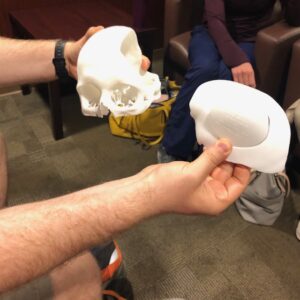
Derek holding a prototype of skull before one of Bryn’s brain surgeries. (Photo courtesy of Robyn Bowles.)
Bryn’s surgery to remove her skull was the first of five brain surgeries in the following seven weeks, with three of them life-saving. She spent 30 days in the ICU, and Robyn described this period as “an abyss of the unknown” as every day brought a new complication. On day six, Bryn suffered a near-fatal brain bleed, and was given her last rites by a priest and the family said their goodbyes, not knowing if she would make it through the day.
After the initial collapse during her run, Bryn lost not only the ability to speak (aphasia) but also developed paralysis and apraxia. Bryn and her family initially had no idea what aphasia was. They struggled to communicate with her, as she couldn’t speak or write. Familiar, everyday things were now foreign. She couldn’t remember what a toothbrush was used for.
“We didn’t realize that she had every word in her head then, but just couldn’t get them out to communicate with us,” said Robyn. Bryn could recognize everyone in her hospital room and identify words and commands, but she could only repeat the phrase “you know” out loud.
On day 31, Bryn was flown by LifeMed Alaska to Denver’s Craig Hospital, where Robyn said the real work started.
Relearning the Basics
Bryn was back to the beginning in terms of communicating and interacting with the world. She had developed global aphasia, apraxia of speech, and paralysis on the left side of her body. With these conditions, she lost her ability to eat, walk, speak, read, write, and understand language.
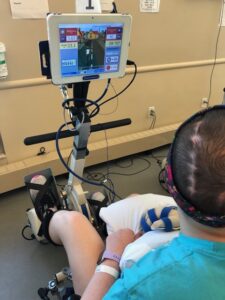
Bryn doing therapy at Craig Hospital. (Photo courtesy of Robyn Bowles.)
Robyn said, “26 years of language was stolen from the left hemisphere of her brain. Once a collegiate honor student, she was now unable to say her name. As her brain began to heal, she worked eight hours daily in therapy at Craig Hospital.”
Bryn began to learn tasks like walking and talking again. She also began to process everything she had lost and to grieve for her life before the brain injury.
Robyn and JB were hopeful but worried. They wondered, What would life be like for her, with the absence of words, and the ability to move? Who would care for her if we can’t someday?
“Our athletic, funny girl who was grad-school bound, was now learning to read, speak and walk again,” said Robyn.
It was hard not being able to hear Bryn’s voice or laugh.
“Parents just want to hear their child’s voice, when you can’t understand your child, it’s incredibly stressful,” Robyn said. “My child needs something, and I can’t figure out what it is.”
A comfort was meeting others who were also supporting their family members with aphasia, and learning how to communicate again. For Robyn, she said it was the difference between losing her mind and not losing her mind, being able to share similar experiences with others.
Watching her daughter relearn how to say her ABCs was not something Robyn had ever envisioned, but that was her new reality. She resigned from her position, and her husband took more time off from his job so they could continue to support Bryn in her recovery.
While at Craig Hospital, the University of Michigan Aphasia Program (UMAP), was recommended by one of Bryn’s Speech-Language Pathologists (SLP). The SLP had attended the University of Michigan as an undergraduate student. Robyn began reading about the program and sharing her findings with the family, and she knew that would be a place for Bryn to progress.
After three months, Bryn was released from the hospital, and she and Derek returned to Texas to live with JB and Robyn. Once Bryn began walking again, they (Robyn and Bryn) began researching and attending outpatient aphasia programs. Bryn attended a few, but was also looking for a more intensive approach.
The UMAP Experience
Bryn attended her first sessions of the U-M Aphasia Program in January and February 2020, and Robyn came with her. They joined other families and people with aphasia from all over the country to take advantage of the individualized, intensive approach UMAP is known for.
One day at lunch, Bryn was communicating with another client and family. The client had a hard time communicating verbally with others, but he was able to express many of his thoughts via handwriting. After learning this, Bryn began to practice her handwriting every day when she had free time. She focused on the alphabet, letters, and phonetics.
“We ordered three ‘Boogie Boards’ on Amazon, one for the car, one for Bryn’s backpack, and one for home,” Robyn said. “It was so exciting to see her working so hard to relearn the written word. We savored every second she could communicate her thoughts with us.”
The next week, after ordering the boards and Bryn’s writing practice, Kait Moses, Bryn’s primary SLP while at the U-M Aphasia Program, asked her questions and Bryn would try to write her answers down.
Her first question that day to Bryn was, is there someone you really admire? If you could meet anyone living on the earth today who would it be?
“Bryn immediately began writing,” Robyn said. “She proudly held the whiteboard up with one perfectly spelled word, ‘OBAMA’.”
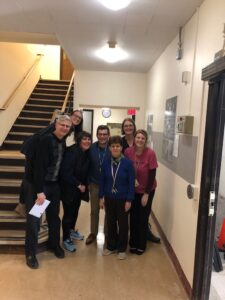
Bryn with the SLPs at UMAP. (Photo courtesy of Robyn Bowles.)
Kait asked what his first name is and she wrote “Barack.” This was Bryn’s first time writing a complete word again after her brain injury.
The in-person session had Bryn working on speech and communication therapy daily from 9 a.m. to 3 p.m. with experienced speech-language pathologists who know aphasia and how to approach her specific situation.
Robyn said she and her family are so grateful to the UMAP team, particularly because of the significant progress that Bryn made during her sessions. The intensive nature of the UMAP program gave the family hope for the future, especially with Bryn’s ability to communicate through written words again.
“The UMAP SLPs are awesome ambassadors for folks and aphasia and counselors to the family members as well,” said Robyn. “The SLPs are really special people and are the experts [in aphasia].”
Adjusting to A New Way of Life
Like many who have aphasia and apraxia, Bryn has continued to work toward recovery, making progress, but slowly and likely for the rest of her life. As a former fast talker, it seems especially frustrating that Bryn has lost her ability to speak fluently.
“Bryn is the same bright, funny person with deep thoughts, but it is difficult to express them,” Robyn said. “She works tirelessly in therapies to facilitate neuroplasticity. She is focused on speech recovery, reading, and grammar 6-8 hours daily at home.”
One of the most difficult parts of aphasia for Bryn is word recovery. Miscommunication can be common and frustrating when trying to converse with others. Describing items and/or finding the right words can take a long time, which can lead to awkwardness.
Bryn explained, “You want to talk to people, but it’s hard now even just to say their name. Talking to more than one person at a time, it’s challenging.”
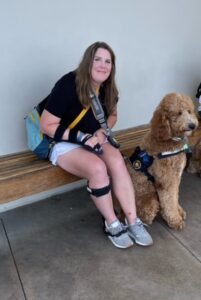
Bryn with her service dog, Kodiak. (Photo courtesy of Robyn Bowles.)
Some days are more difficult than others.
“Sometimes, it’s hard not to focus on all she’s lost (especially because of her age – 26),” said Robyn. “She had fallen in love with this great guy, she had so much ahead of her. She had just passed her board certification as a Critical Care Registered Nurse and was making plans for her graduate school entrance exams. Life is beautiful and hard, and I have moments where I am both thankful and broken.”
However, the family focuses on what the brain injury could not take away — including Bryn’s essence, her love for life, her current abilities, and her drive to help others.
Today, Bryn has shifted her focus to helping others in new ways, specifically to help those with aphasia. She helps with technology for day-to-day communication and chats with them about how they are doing with their diagnosis.
“I love helping other people, and they help me too, especially with aphasia and apraxia,” Bryn said. “It makes me happy.”
Similarly, this is how Robyn’s family would describe her as well – as a fellow helper, and supporter to others. Derek, Bryn’s partner, noted that when considering Brynn’s drive to help and to continue to push through challenges — that particular apple didn’t fall far from the tree.
“Robyn, any time she’s hit with adversities, she doesn’t turn away,” said Derek. “She hits it head-on and deals with it. She can take horrible things and help other people who are going through similar things. Robyn has a gift of taking a difficult situation and making it beautiful.”
Living With Joy, Vulnerability, and Kindness
Bryn leads “Tip of my Tongue” and word-finding groups weekly for people with aphasia. Her groups welcome all forms of communication — not just speech.
“Even though I work full-time in the medical field, she works more than me,” Derek said. “Bryn pulls all-nighters and does more work to prepare for her groups and work with others. It’s amazing to see how driven she is.”
Bryn has also continued her therapy journey, participating in multiple outpatient programs, including returning to Craig Hospital to attend their aphasia therapy program in November 2020, and also participated in online therapy with Integrative Reconnective Aphasia Therapy (IRAT).
She also began working with the Integrative Reconnective Aphasia Therapy Center as a group facilitator, and has a webpage where she shares videos about technology tips, apps, and “all things aphasia.”
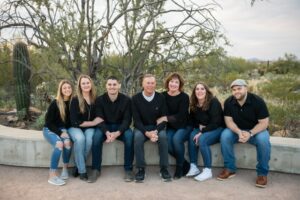
Family photo, Robyn is third from the right. (Photo courtesy of Robyn Bowles.)
Robyn, JB, Bryn, and Derek now all live near each other in Arizona. They plan to relocate to the Pacific Northwest in the near future.
Bryn and Robyn maintain their close relationship, even with the new communication challenges.
“We’d always been close,” shared Bryn. “We would talk to each other every day on the phone, before the brain injury. Now, we see each other in person all the time, as we live just minutes away from each other. It’s amazing, as not only does my mom help me, but she also helps other people with aphasia as well, and participates in support groups for other family members caring for those with aphasia.”
Robyn reiterated the sentiment about Bryn.
“I am so honored to be on this life journey with Bryn, she’s my friend and trusted colleague,” she said. “Bryn never stops working and is a warrior. She’s living a life where she still is focused on helping others, even while navigating her own journey, and doing it with joy, vulnerability, and kindness.”
Robyn’s Online Journal About Her Experience
After Bryn’s initial surgery and hospital entry, Robyn started an online journal to share updates with friends and family. You can read these entries at https://www.caringbridge.org/visit/brynbowles/journal.
Bryn’s Groups:
For those interested in Bryn’s groups, please visit the Tip of My Tongue Team webpage. She leads a support group and a word-finding support group, both for people with aphasia.
About the U-M Aphasia Program and UCLL
The University Center for Language and Literacy (UCLL) is committed to helping people of all ages find meaningful ways to communicate. UCLL is part of the Mary A. Rackham Institute (MARI) at the University of Michigan. MARI provides high-quality, individualized mental health, neuropsychological testing, and language and literacy services to the community through its service centers, including UCLL, University Center for the Child and Family (UCCF), and University Psychological Clinic.

